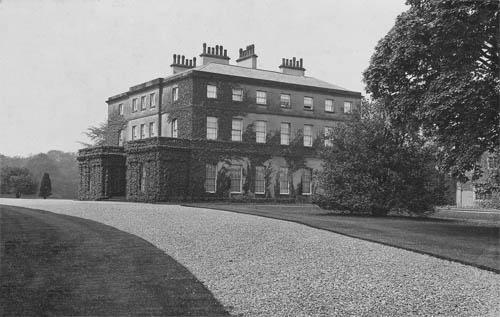Thonock Hall
Lincolnshire
| Location | Thonock | ||
| Year demolished | 1964 | ||
| Reason | Surplus to requirements, becoming derelict before demolition | ||
| See all images: | Gallery | ||
| << Back to the main list |
Text written by, and copyright of, Nicholas Kingsley - many thanks
The Thonock estate was acquired by Sir Willoughby Hickman (d. 1720), 3rd bt., sometime around 1700, and he moved from the ancient Old Hall in Gainsborough (where his family had lived since 1586) to what was presumably a more up-to-date house at Thonock. Some elements of this building may have been preserved among the gabled outbuildings of a later seven by five bay house of two-and-a-half storeys, built c.1760-70 for his grandson, Sir Neville George Hickman (d. 1781), 5th bt. I base my estimate of the date of the house largely on the panelled interiors, which seem to have survived relatively unaltered until the house was demolished, and I would be interested to know whether others agree with my assessment of the date, or whether you think the house might be earlier or later.
 Sir Neville left no male heirs, and his Thonock and Gainsborough estate descended to his daughter, who 'lived a good deal retired at Thonock Hall' until her death in 1827, when she bequeathed the property to her distant kinsman, Henry Bacon, a younger son of Sir Edmund Bacon (d. 1820), 8th/9th bt. Henry was probably responsible for remodelling the house in about 1830. The whole house may have been refaced, and alternate windows on the seven bay west front were blocked, giving it the appearance of four widely-spaced bays. The entrance, which had presumably originally been into the middle bay of the seven bay house, was moved to an off-centre position below the second bay, and given a porch. On the five-bay south elevation, the ground floor was brought forward in two square bays decorated with Tuscan pilasters, between which a new main entrance was created, also decorated with Tuscan pilasters. The east elevation appears to have been little altered from its 18th century form, although the ground-floor windows were apparently lengthened.
Sir Neville left no male heirs, and his Thonock and Gainsborough estate descended to his daughter, who 'lived a good deal retired at Thonock Hall' until her death in 1827, when she bequeathed the property to her distant kinsman, Henry Bacon, a younger son of Sir Edmund Bacon (d. 1820), 8th/9th bt. Henry was probably responsible for remodelling the house in about 1830. The whole house may have been refaced, and alternate windows on the seven bay west front were blocked, giving it the appearance of four widely-spaced bays. The entrance, which had presumably originally been into the middle bay of the seven bay house, was moved to an off-centre position below the second bay, and given a porch. On the five-bay south elevation, the ground floor was brought forward in two square bays decorated with Tuscan pilasters, between which a new main entrance was created, also decorated with Tuscan pilasters. The east elevation appears to have been little altered from its 18th century form, although the ground-floor windows were apparently lengthened.
Henry Bacon died without issue and his Lincolnshire estate passed to his elder brother, Sir Edmund Bacon (1779-1864), 9th/10th bt., and then descended with the baronetcy to the mildly eccentric Sir Hickman Beckett Bacon (1855-1945), 11th/12th bt., who inherited in 1872 and lived in the house until his death, but never got around to installing gas, electricity or bathrooms. Sir Hickman was unmarried, and at his death the estate passed to his nephew, Sir Edward Castell Bacon (1903-82) of Raveningham Hall. For him, Thonock was very much a secondary estate (even though it was 10,000 acres compared to the 4,000 acres the family had in Norfolk), and when he visited he preferred the greater comfort of the agent's house in Gainsborough. Thonock Hall was shut up, and dry rot and woodworm did their worst. In 1964 the decision was taken to demolish Thonock Hall and a golf course was later created in the park, but the family continues to own the estate.